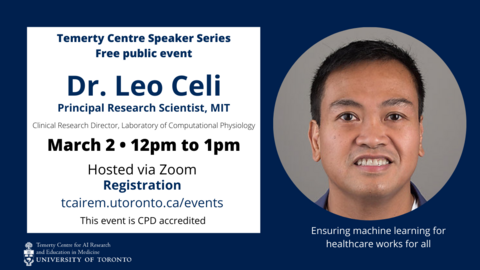Main Second Level Navigation
Dr. Leo Celi - Public Lecture
THIS EVENT IS NOW OVER.
A video recording of this lecture will has been posted to our Past Events page.
DATE: March 2, 2021 (Tuesday)
TIME: 12pm to 1pm (EST)
METHOD: Zoom
COST: Free
AUDIENCE: Open to the public
NOTE TO PHYSICIANS: This event is CPD accredited
About the lecture
Ensuring machine learning for healthcare works for all
The gaps in the medical knowledge system stem from the systematic exclusion of the majority of the world’s population from health research. These gaps combined with implicit and explicit biases lead to suboptimal medical decision making which negatively impact health outcomes for everyone, but especially those in groups typically under-represented in health research. Recent developments in machine learning and AI technologies hold some promise to address the issues with the generation of scientific evidence and human decision making. Healthcare is flawed, and it must be reformed so that it equitably benefits all. Effective and equitable machine learning, data science and AI will be an essential component of these efforts.
Learning objectives
1. Participants will be able to appreciate why the status quo in care delivery marked by health inequities is not acceptable.
2. Participants will be able to understand how artificial intelligence can permanently ingrain or even widen disparities in health outcomes.
3. Participants, whatever their background, will be inspired to be advocates for change in the healthcare arena.
About Dr. Leo Celi
Leo Anthony Celi MD MS MPH
Principal Research Scientist, MIT
Associate Professor (Part Time), Harvard Medical School
Staff Intensivist, Beth Israel Deaconess Medical Center
Instructor, Department of Biostatistics, Harvard T.H. Chan School of Public Health
Dr. Celi is the clinical research director and principal research scientist at the MIT Laboratory for Computational Physiology (LCP) and a practicing intensive care unit (ICU) physician at the Beth Israel Deaconess Medical Center (BIDMC). He brings together clinicians and data scientists to support research using data routinely collected in the process of care.
His group built and maintains the publicly-available Medical Information Mart for Intensive Care (MIMIC) database and the Philips-MIT eICU Collaborative Research Database, with more than 13,000 users from around the world.

